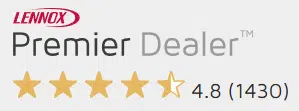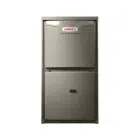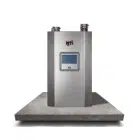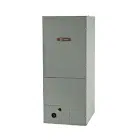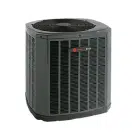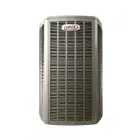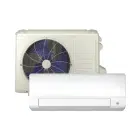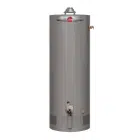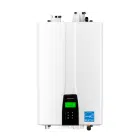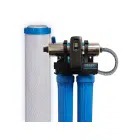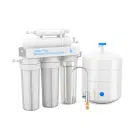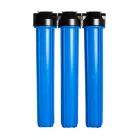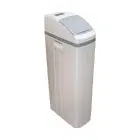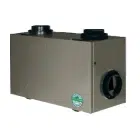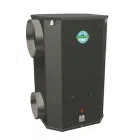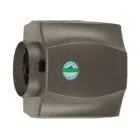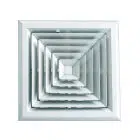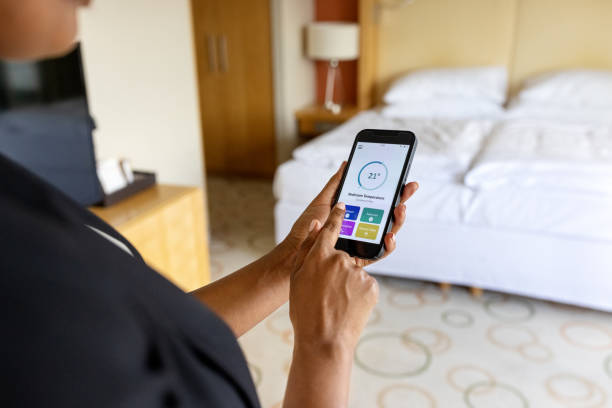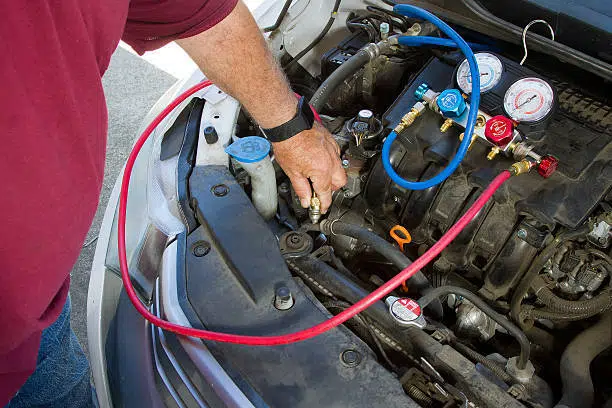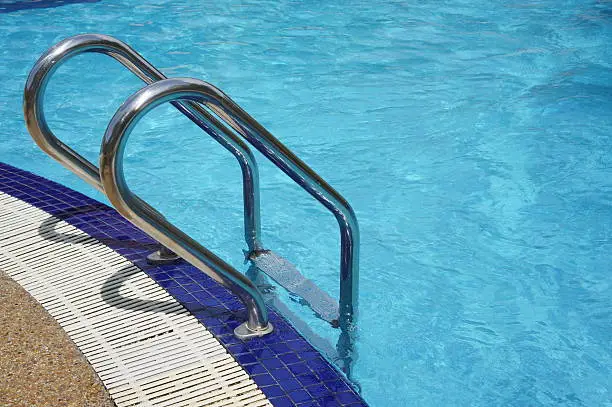
Table of Contents
Owning a pool is a fantastic way to enjoy the summer, but maintaining the ideal water temperature can be a challenge, especially in a climate like Canada’s. With short summers and cooler temperatures during spring and fall, it’s crucial to have a reliable way to keep your pool comfortable. That’s where heat pump pool heaters come in. These innovative systems efficiently maintain your pool’s temperature, helping you extend your swimming season without breaking the bank. Let’s dive into why heat pump pool heaters are the best choice for your pool and why you should seriously consider them.
What Makes Heat Pump Pool Heaters Stand Out?
Heat pump pool heaters are unique in how they operate. Unlike traditional heating methods that burn fuel or consume large amounts of electricity to generate heat, pool heaters move heat from the air into your pool water. It’s a simple yet effective process: the pump draws in outside air, extracts its heat, transfers that heat to the pool water, and then releases the cooled air back into the environment. This method is not only energy-efficient but also cost-effective, making it a smart investment for pool owners.
From our experience, heat pump pool heaters are one of the most economical solutions for heating a pool, particularly over the long term. While the initial installation cost might be higher than some other heating options, the ongoing savings on energy bills more than justify the upfront expense. Plus, they’re perfectly suited to the Canadian climate, where even summer nights can get quite cool.
Feature | Traditional Heating Methods | Heat Pump Pool Heaters |
|---|---|---|
Heating Source
| Burns fuel (natural gas, propane) or uses electric resistance | Transfers heat from the air to the pool water |
Energy Efficiency (COP)
| Low (typically around 1)
| High (COP ranging from 3 to 7)
|
Operating Costs
| High (due to fuel or electricity consumption) | Low (significantly lower energy consumption)
|
Environmental Impact
| High (emits CO2 and other pollutants) | Low (minimal emissions, can be paired with renewable energy)
|
Speed of Heating
| Fast (especially gas heaters)
| Moderate (heats slower but maintains temperature efficiently)
|
Initial Cost
| Lower upfront cost | Higher upfront cost
|
Maintenance
| Requires regular maintenance (fuel supply, burner cleaning)
| Low maintenance (cleaning and occasional check-ups) |
Lifespan
| Shorter lifespan (10-15 years) | Longer lifespan (15-20 years) |
Suitability for Year-Round Use
| Limited (less efficient in colder weather) | Highly suitable (designed to work even in cooler climates) |
Dependence on Weather
| Low (can operate in any weather but less efficient in cold) | Moderate (performance slightly decreases in very cold weather) |
Noise Level
| Low to Moderate | Moderate (depending on the model) |
Eco-Friendly and Forward-Thinking
In today’s world, being environmentally conscious is more important than ever, and heat pump pool heaters are at the forefront of green technology. Unlike gas heaters, which emit carbon dioxide and other harmful substances, heat pump pool heaters rely solely on electricity and ambient air. This not only reduces your carbon footprint but also positions your pool for future integration with renewable energy sources like solar panels.
We’ve crunched the numbers and concluded that even considering that electricity in Canada often comes from fossil fuels, heat pump pool heaters are significantly more environmentally friendly than other heating options. If you’re already using or planning to install solar panels, a heat pump pool heater is the perfect complement to create a completely green heating system for your pool.
Curious about how The Canada Greener Homes Loan can help you make your home more energy-efficient and comfortable? Read all the details on the official website.
Saving Money With Energy Efficiency
Energy efficiency is where pool heaters really shine. Traditional gas heaters and electric heaters consume energy to create heat directly, which isn’t the most efficient way to warm a pool. In contrast, heat pump pool heaters use the energy in the surrounding environment, allowing them to operate with a coefficient of performance (COP) ranging from 3 to 7. This means that for every unit of electricity they use, they generate three to seven units of heat.
Through our observations, we’ve found that using a heat pump pool heater can reduce energy bills by 50-70% compared to other heating methods. This is particularly noticeable over a long swimming season when you need to maintain the pool at a comfortable temperature for several months. For anyone looking to save on energy costs while still enjoying a warm pool, heat pump pool heaters are a no-brainer.
We created this table to clearly illustrate the differences in energy efficiency between pool heaters and traditional heating methods, such as gas and electric heaters.
Heater Type | Energy Source | Efficiency (COP) | Energy Cost Savings |
|---|---|---|---|
Heat Pump Pool Heater | Uses energy from the surrounding environment | 3 to 7 | Reduces energy bills by 50-70% |
Traditional Gas Heater
| Consumes gas directly to create heat | N/A | Less efficient, higher energy costs |
Traditional Electric Heater | Consumes electricity directly to create heat | N/A | Less efficient, higher energy costs |
Check out our previous article to find out how you can save up to $7800 on your new heat pump with Government Rebates Programs in Ontario.
https://thehvacservice.ca/government-heat-pump-rebates-in-ontario/
Check out our previous article to find out how you can save up to $7800 on your new heat pump with Government Rebates Programs in Ontario.
https://thehvacservice.ca/government-heat-pump-rebates-in-ontario/
Year-Round Reliability: Say Goodbye to Cold Water
Canadian weather is known for its unpredictability, especially during the shoulder seasons. Many clients ask, “How well do heat pump pool heaters work in cold weather?” The answer is simple: modern pool heaters are designed to operate efficiently even in low temperatures. While their performance can dip slightly as temperatures drop, we’ve found that even at around 40°F (5°C), they can still keep your pool comfortable.
From our experience, regular heat pump maintenance is key to ensuring your heat pump pool heater operates reliably, even in cooler weather. This includes tasks like cleaning the heat exchangers and regularly checking the circulation systems. We always recommend scheduling maintenance before and after the swimming season to ensure the heater runs smoothly throughout the year.
Why a Heat Pump Is the Superior Choice
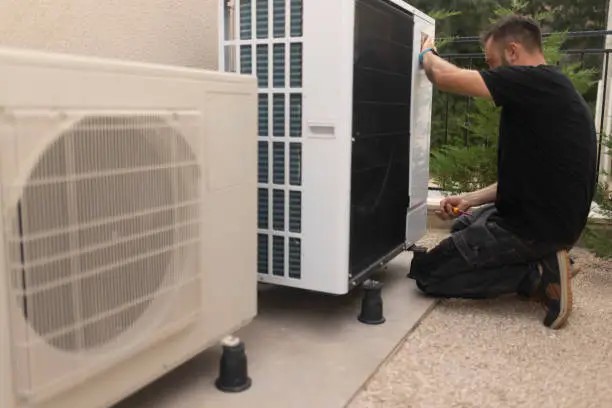
When it comes to choosing a pool heater, many pool owners start by comparing different options. Traditional gas heaters are powerful and can quickly heat a pool, but they come with ongoing fuel costs and a significant environmental impact. Electric resistance heaters, on the other hand, consume vast amounts of energy, making them expensive to operate. Solar heaters are a great option but depend on weather conditions and require a large area for installation.
After analyzing all these systems, we confidently state that heat pump pool heaters offer the best balance. They are more cost-effective than gas heaters and less weather-dependent than solar systems. Additionally, pool heaters can operate year-round, regardless of whether it’s a sunny day or overcast.
Choosing the Right Heat Pump for Your Pool
When choosing the right heat pump pool heater, there are several key factors to consider to ensure your pool stays comfortably warm and energy-efficient:
- Pool Size: The larger your pool, the more powerful the heat pump needs to be. A correctly sized heater is crucial to maintaining a consistent temperature without overworking the system.
- Climate: If you live in a colder region, opt for a heat pump with extra capacity to handle lower temperatures effectively. This ensures the heater can still perform well even when the weather isn’t ideal.
- Professional Consultation: It’s always best to consult with a professional before making a purchase. An incorrectly sized heat pump may not only fail to keep your pool warm but could also lead to higher energy consumption and unnecessary costs.
- Installation Considerations: Pay attention to your local climate conditions and any potential restrictions on where the equipment can be placed during installation. Proper placement can significantly impact the efficiency and longevity of your heat pump.
If you need professional guidance on choosing the best heat pump pool heater for your needs, feel free to reach out to us using the link below. We’re here to help you make the right choice and ensure your pool stays perfectly warm and inviting all year round.
Conclusion: Heat Pumps Are the Best Choice
In conclusion, heat pump pool heaters are one of the smartest investments you can make for your pool in Canada. They’re economical, environmentally friendly, and reliable in all weather conditions. If you want your pool to be ready for swimming whenever you are, regardless of the weather, a heat pump pool heater is exactly what you need.
Finally, if you have any questions or would like to discuss the possibility of installing a heat pump pool heater for your pool, we’re here to help. Our team has years of experience working with these systems and can guide you in choosing the best solution for your home. Contact HVAC Service Solutions, and together we’ll make your pool comfortable and warm all year round!
Frequent Asked Questions
How do heat pump pool heaters work?
Heat pump pool heaters operate by extracting heat from the air and transferring it to your pool water. They use a refrigeration cycle, where a fan draws in outside air and passes it over an evaporator coil filled with refrigerant. The refrigerant absorbs the heat, which is then compressed to increase its temperature further. This hot gas moves through a heat exchanger that transfers the heat to the pool water, warming it up. The now-cooled refrigerant is recycled back to start the process again. This method is highly efficient, as it relies on ambient air rather than generating heat directly.
Are heat pump pool heaters effective in cold climates like Canada?
Yes, modern heat pump pool heaters are designed to work efficiently even in cooler climates. While their performance may decrease slightly in very low temperatures, they are still capable of maintaining a comfortable pool temperature in regions with cold weather. Many units are equipped with advanced technology that allows them to function effectively in temperatures as low as 40°F (5°C). However, in extremely cold conditions, you might need a more powerful unit or a backup heating system to ensure consistent warmth.
How energy-efficient are heat pump pool heaters compared to other heating methods?
Heat pump pool heaters are among the most energy-efficient options available. They typically operate with a coefficient of performance (COP) between 3 and 7, meaning they produce three to seven times more heat energy than the electrical energy they consume. In contrast, traditional electric resistance heaters have a COP of 1, and gas heaters have even lower efficiency. This high efficiency translates to significantly lower operating costs, making heat pump pool heaters a cost-effective choice in the long run.
What is the lifespan of a heat pump pool heater?
The average lifespan of a heat pump pool heater ranges from 15 to 20 years, depending on the model and how well it is maintained. Regular maintenance, such as cleaning the evaporator coil, checking refrigerant levels, and ensuring proper airflow, can extend the lifespan of the unit. Additionally, protecting the heater from harsh weather conditions and keeping it free from debris will contribute to its longevity. Proper care ensures that your heat pump pool heater remains efficient and reliable for many years.
How long does it take for a heat pump pool heater to warm up a pool?
The time it takes to heat a pool with a heat pump pool heater depends on several factors, including the size of the pool, the initial water temperature, the desired temperature, and the ambient air temperature. Generally, it can take anywhere from 24 to 72 hours to raise the temperature of a pool by 10 to 20 degrees Fahrenheit. Keep in mind that heat pumps are designed to maintain a set temperature rather than rapidly heat the water, so for the best results, it’s advisable to keep the heater running consistently during the swimming season.
Can a heat pump pool heater be used with a solar pool cover?
Yes, using a solar pool cover in conjunction with a heat pump pool heater is highly recommended. A solar cover helps retain the heat in the water, reducing heat loss due to evaporation, especially at night or during cooler weather. This can significantly improve the efficiency of the heat pump by reducing the workload required to maintain the desired water temperature. Combining both methods can lower your energy costs and extend the swimming season, making your pool more enjoyable and economical to operate.
What maintenance is required for a heat pump pool heater?
Maintaining a heat pump pool heater is relatively simple but crucial for its efficiency and longevity. Regularly cleaning the evaporator coil, checking for obstructions in the airflow, and ensuring that the unit is free of debris are important steps. Additionally, you should have a professional inspect the refrigerant levels and overall system operation annually. It’s also advisable to cover the unit during the off-season to protect it from harsh weather. Regular maintenance ensures optimal performance and helps prevent costly repairs.
How much does it cost to install a heat pump pool heater?
The cost to install a heat pump pool heater can vary depending on the size of the unit, the complexity of the installation, and your location. On average, installation costs range from $3,000 to $7,000, including the price of the heater itself. While this may be more expensive upfront compared to other heating methods, the long-term energy savings and the extended lifespan of the unit make it a cost-effective investment. Consulting with a professional can help you get a more accurate estimate based on your specific needs.
Is a heat pump pool heater environmentally friendly?
Yes, heat pump pool heaters are considered environmentally friendly because they use less energy to generate heat compared to traditional gas or electric resistance heaters. They produce no direct emissions, and their high efficiency means they consume less electricity. If paired with renewable energy sources like solar panels, the environmental impact can be further minimized. This makes heat pump pool heaters a great choice for eco-conscious pool owners who want to reduce their carbon footprint.
How do I choose the right size heat pump pool heater for my pool?
Choosing the right size heat pump pool heater depends on several factors, including the size of your pool, the desired water temperature, and the local climate. A larger pool will require a more powerful heater to maintain a comfortable temperature. Additionally, if you live in a colder region, you may need a unit with higher capacity to ensure effective heating. It’s essential to consult with a professional to correctly size the heater based on these variables, as an incorrectly sized unit could lead to higher energy costs and inefficient heating.
If you need professional guidance on selecting the best heat pump pool heater for your specific needs, feel free to reach out to us via the link below. We’re here to help you make the right choice and ensure your pool stays warm and inviting all year round.
Share
